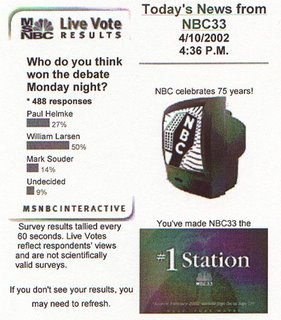Earmarking: Larsen v. Souder
Earmarking in the budget has led to many pork-barrel projects throughout the country. Should Congress end this practice? Why or why not.
"Larsen: There are two sets of books our politicians like to keep, the general and unified budgets. The unified budget includes every government expense while the general budget excludes Social Security and Medicare. Politicians like to use the unified budget because they can show a lower deficit number. In 2004 they passed a unified budget resulting in a $553.6 billion deficit. Excluding Social Security's dedicated cash surplus, the general budget deficit was $726.1 billion.
There was Katrina and now we have the Rx Medicare drug program. The deficit this year is going to be over $800 billion. Interest on the debt is over $450 billion or 40 cents of every dollar we pay in federal income taxes. The problem is, they could eliminate the unified budget deficit and still have a very large general budget deficit. We need to eliminate earmarks, require each bill to cover one area and one area only, and we need to prevent politicians from inserting language in the bill at the last minute without anyone's knowledge. The reason is simple: Congress cannot say no to anything. They cannot budget and they keep buying votes with our money. The simple answer is we cannot afford earmarks."
"Souder: Without specific set-asides in congressional funding bills for local projects (such as C.R. 17), I believe that those of us in north-central and northeast Indiana would see our taxpayer dollars sent by bureaucrats in Washington to other states, or within Indiana, to Indianapolis and Lake County. Congressional earmarks allow us to return our tax dollars back home through our elected representatives and I support the practice. I will support restrictions on the number of earmarks and more fairness in their distribution.
I have always been open about the earmark requests that I have made. I believe that all members of Congress should have to reveal their requests, which is why I'm an original cosponsor of H.R. 4964, the Earmark Transparency and Accountability Act of 2006. This bill would prohibit the last-minute insertion of earmarks in conference reports by requiring any earmark to have first been included in the House- or Senate-passed version of the bill. It would also identify which member of Congress requested each earmark and the earmarks would be available to the public on the Internet at least 72 hours before the funding bill's consideration."



0 Comments:
Post a Comment
<< Home